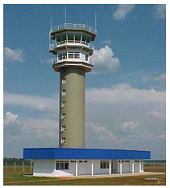Embraer Performs AeroMACS Tests with Siemens in Brazil — WiMAX Forum
The Simulation Proved Aeronautical Mobile Telemetry Services and AeroMACS Can Operate Together Without Interference

Embraer AeroMACS Test
CLACKAMAS, Ore. – Sept. 14, 2017 – PRLog — Embraer conducted tests to evaluate how two services— Aeronautical Mobile Telemetry (AMT) and Aeronautical Mobile Airport Communication System (AeroMACS)—can operate together without interference at the EMBRAER test facility in Gaviao Peixoto, Brazil. It was important to test it and establish the frequency separation required to optimize the spectrum without causing interference between the two services. Using SIEMENS RUGGEDCOM equipment, Embraer performed the simulated ground operations tests with support from the WiMAX Forum and participation from the Brazilian Department of Airspace Control (DECEA).
AeroMACS and AMT services work separately but share the same spectrum band. AeroMACS operates in the protected and licensed spectrum band from 5091 MHz to 5150 MHz, which the International Telecommunication Union (ITU) designated on a worldwide basis to support the safety and regularity of flight at the World Radiocommunication Conference in (WRC-07). Enabling broadband communications to aircraft on the ground, service vehicles, and distributed airport assets, AeroMACS provides the increased bandwidth needed for a large number of applications that must coexist. For the AMT system, the aircraft sends data from its embedded telemetry unit to the ground unit. Flight test engineers use this data to follow the test of the aircraft in real time.
The tests checked the frequency separation conditions of the Telemetry and AeroMACS services for interference, measured the signals of both channels, and recorded data through the spectrum analyzer. The AeroMACS communication tests used the OMS (Onboard Maintenance System) service that is typically on the Embraer aircraft as a packet generator and acknowledgment of receipt, simulating in full the interferences that could occur in an aircraft or at an airport. The OMS service is responsible for the aircraft maintenance:
“Using our aircraft, I’m pleased that Embraer drove this extremely important and successful testing,” said Luiz Fernando de Souza, Embraer Flight Test Instrumentation. “All objectives were met, and valuable data was collected to inform how to effectively deploy the Telemetry and AeroMACS services from aircraft to ground units.”
“The tests were well planned and conducted in an wfv effective manner,” said Noam Ivri, Siemens AeroMACS Product Manager. “Siemens is excited to support such AeroMACS tests and provide worldwide implementations with our equipment on all parts of the airport surface.”
“We are thrilled to have accomplished the tests without encountering any significant technical issues,” said Declan Byrne, President of the WiMAX Forum. “AeroMACS is key to the aviation industry because it improves communications on the airport surface. By providing increased transmission of Air Traffic Control (ATC) and Airline Operations Communications (AOC), AeroMACS will relieve traffic, reduce congestions, prevent delays, and support the safety and regularity of flight.”
The testing was successful as the simulation proved that the Telemetry and AeroMACS services can operate together and also provided guidance on the channel spacing. The test results were presented to the International Civil Aviation Organization (ICAO) Fifth Working Group Meeting, and to the Brazilian Regulator (Anatel) for review and consideration. The subject is expected to be included in the Anatel regulatory agenda in 2019-2020, and the addendum to the current resolution should include the AeroMACS frequency according the Geneva World Radiocommunication Conference (WRC-12).
To review complete report in English, please click: http://files.wimaxforum.org/
About DECEA: The Department of Airspace Control (DECEA) is responsible for the management of all the activities related to the safety and efficiency of the Brazilian airspace control. Its mission is to manage and control the air traffic in the Brazilian sovereign airspace as well as to guarantee its defense. As the main organization of the Brazilian Airspace Control System (SISCEAB), DECEA plans and approves the deployment of equipment and systems and oversees technical and operational organizations responsible for activities related to SISCEAB. DECEA provides services such as Aeronautical Information System (AIS), Air Traffic Management, Aeronautical Cartography, Search and Rescue, Aeronautical Meteorology, Information Technology, Flight Inspection, Military Air Operation Support, Air Navigations Aids and Aeronautical Telecommunication. For more information visit: https://www.decea.gov.br.
About Embraer: Embraer S.A. is a Brazilian aerospace conglomerate that produces commercial, military, executive and agricultural aircraft and provides aeronautical services. It is headquartered in Sao Jose dos Campos, Sao Paulo State. The Company produces aircraft for commercial and executive aviation, and for defense and security purposes, and related services. Its segments include Commercial aviation business, Executive Jet business, Defense and Security Business segment, and Other Related Businesses segment, which provides fuel systems, structural parts, and mechanical and hydraulic systems to Sikorsky Aircraft Corporation for its production of helicopters. For more information visit: www.embraer.com/
About Siemens: Siemens is a global powerhouse focusing on the areas of electrification, automation and digitalization. Siemens Process Industries and Drives Division help its customers increase productivity, safety, reliability, efficiency and time-to-market for plants and processes with innovative, integrated technology across the entire lifecycle. In infrastructure and industry solutions the company plays a pioneering role. For more information visit: www.siemens.com/
About the WiMAX Forum: The WiMAX Forum is an industry-led, not-for-profit organization that certifies and promotes the compatibility and interoperability of broadband wireless products based upon IEEE Standard 802.16. The WiMAX Forum’s primary goal is to accelerate the adoption, deployment and expansion of WiMAX, AeroMACS, and WiGRID technologies across the globe while facilitating roaming agreements, sharing best practices within our membership and certifying products. WiMAX Forum and WiGRID Certified® products are interoperable and support broadband fixed, nomadic, portable, and mobile services. For more information, visit: http://www.WiMAXForum.org.




